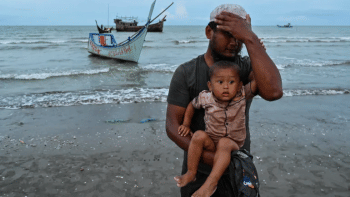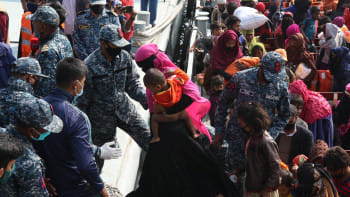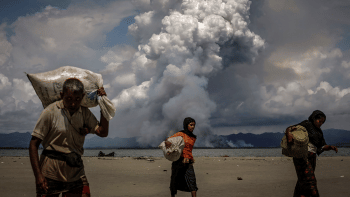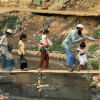The international community has failed to protect the Rohingya

The Rohingya, fighting alongside other ethnic groups, contributed to the independence struggle of Myanmar, the erstwhile Burma. However, since the early 1970s, they have faced ongoing persecution and oppression by the military government of Myanmar. This systematic abuse culminated in August 2017 when the Myanmar government launched a brutal crackdown on the Rohingya population. Approximately 700,000 Rohingya were forced to flee across the border to the Cox's Bazar refugee camp in Bangladesh, which now hosts over a million refugees. During this violent campaign, an estimated 9,000 Rohingyas were killed and numerous villages were destroyed in 2018.
The situation for the Rohingya worsened with the 2021 military coup in Myanmar, which further increased their vulnerability. The military government, along with the Arakan Army, continued to target the Rohingya, exacerbating their plight. As of July 2024, the crisis remains dire, over 100,000 Rohingya live as refugees in Malaysia, with thousands more in Indonesia, Thailand, and over a million in Bangladesh.
One of the most glaring failures of the international community was its inability to act promptly during the peak of the genocide in 2017. The absence of emergency intake or resettlement programmes at that critical time is a damning indictment of the global response to the Rohingya crisis. Over the years, the Rohingya crisis has become a stark example of the consequences of prolonged and systematic persecution. The Rohingya community, both in Myanmar and in the diaspora, has faced unimaginable hardships. The response from the international community, including regional bodies like the Association of Southeast Asian Nations (ASEAN), has been woefully inadequate. While emergency aid has been provided, long-term solutions have been conspicuously absent. The lack of innovative resettlement programmes and socio-economic inclusion initiatives has left many Rohingyas in a state of limbo, unable to rebuild their lives or integrate into their host communities. They continue to face harsh living conditions and uncertain futures.
As of August 2024, the recent intensification of the conflict between the Arakan Army and the Myanmar military has subjected the Rohingya community to yet another wave of genocide. Thousands of innocent Rohingya civilians have been forcibly recruited into the conflict, leaving many homeless and trapped within Arakan. While some have managed to escape to Bangladesh, many tragically perished in the Naf river during their desperate attempts to flee the ongoing violence. The absence of any effective protection mechanisms for the Rohingya has only exacerbated their suffering in this dire situation.
Rohingya refugees in Cox's Bazar continue to face ongoing challenges in terms of protection, including sexual and gender-based violence, trafficking of Rohingya women and girls, forced recruitment of youth into armed groups, inadequate medical support for the sick, elderly, and children, and the absence of comprehensive and sustainable educational platforms. For the children and young generation of Rohingya who witnessed the unimaginable, inhumane mass atrocities during the August 2017 genocide, the lack of sustainable, practical, and comprehensive means of accessing education and psychosocial support is a significant red flag and barrier to their ability to heal from trauma and become self-reliant individuals. In the long term, this will be the very reason why the Rohingya community will struggle to integrate successfully, if and when they are repatriated or resettled in another country.
Given the ongoing challenges of securing sustainable funding, preventing the Rohingya from living safe and dignified lives in refugee camps or host countries is neither a realistic nor a comprehensive humanitarian response. The perspective towards Rohingya refugees needs to shift from viewing them as a burden to recognising them as a competent community capable of rebuilding itself with the right support from international communities, civil societies, INGOs, NGOs, and states.
On repatriation, international communities and states must learn the lessons from the 1992 repatriation, and consult and strategise with the Rohingya community. This includes Rohingya from refugee camps, refugee host countries, IDPs, and the diaspora. This must be done to ensure a dignified repatriation that facilitates the safe and successful integration of the Rohingya back into Myanmar as one of the country's ethnic groups, preventing history from repeating itself.
Navigating the media landscape has been a formidable challenge. The Myanmar military's negative portrayal of the Rohingya has influenced public perception, not just within Myanmar but also in neighbouring Southeast Asian countries. This has resulted in unwelcoming attitudes in host communities, making life even more difficult for Rohingya refugees. Despite these challenges, the Rohingya diaspora has worked tirelessly to change the narrative surrounding the Rohingya people, and to raise global awareness about their plight. The international media has played a crucial role in highlighting their situation, but consistent and accurate representation remains a struggle.
With the recent political changes in Bangladesh, there is a unique opportunity to implement innovative approaches to the protection and inclusion of the Rohingya. This could involve capacity-building initiatives, socio-economic integration, and the development of sustainable human rights protections until long-term solutions such as resettlement and repatriation are implemented.
The international community must also take a hard look at its response over the past seven years and develop a more effective humanitarian framework that can inform both political and diplomatic strategies.
Most importantly, any solution must involve consultation with the Rohingya community itself. Only by working with the Rohingya, understanding their needs, and supporting their efforts to rebuild their lives, can the international community hope to address this crisis in a meaningful, sustainable and comprehensive way. The Rohingya have shown remarkable resilience in the face of adversity; now it is time for the world to show its commitment to justice and human dignity.
Hafsar Tameesuddin is co-secretary general of Asia Pacific Refugee Rights Network
Views expressed in this article are the author's own.
Follow The Daily Star Opinion on Facebook for the latest opinions, commentaries and analyses by experts and professionals. To contribute your article or letter to The Daily Star Opinion, see our guidelines for submission.

 For all latest news, follow The Daily Star's Google News channel.
For all latest news, follow The Daily Star's Google News channel. 











Comments